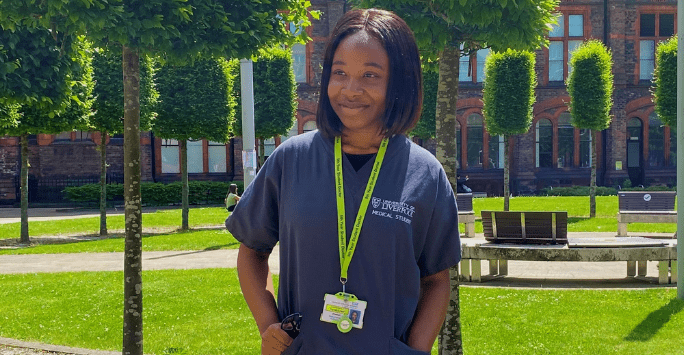
Student Doctor Temiloluwa Oluokun is proud that her research into breast cancer, completed as part of her elective in Nigeria, has been published in the JCO Global Oncology journal. She tells us more about her findings from the review, and her elective experience overall.
My interest in oncology was sparked during clinical placements at The Clatterbridge Cancer Centre, where I learnt more about the burden of cancer, as well as the physical, social and emotional impact of the disease on patients. This, coupled with the dynamic nature of the speciality, inspired me to take an elective in my home country at the end of fourth year.
I completed my clinical oncology elective at the Lagos State University Teaching Hospital in Nigeria where I was fortunate to work with some remarkable doctors and health professionals. I also had the opportunity to co-author a research study on the levels of evidence of breast cancer publications in the country.
In Nigeria, breast cancer accounts for almost a quarter of all new cancer cases in women.
A few locally developed treatment protocols have been adapted from international cancer guidelines, due to the scarcity of robust, evidence-based research studies in the country. However, given that significant disparities exist in breast cancer presentation and outcomes among women of African and European descent, the diagnostic practices and treatments patients receive should also be proven effective through high quality research.
Despite clinicians’ increasing awareness of the importance of evidence-based medicine (EBM) in the management of breast cancer, not much is known about the availability of research studies needed to ensure EBM in Nigeria, particularly regarding methodology and study design.
Our review findings revealed that that most studies on breast cancer in Nigeria are at low levels of evidence, mainly case reports and cross-sectional studies.
Though the number of research studies has markedly increased since the turn of the millennium, few higher-level research studies (randomized controlled trials, cohort studies) have been conducted due to barriers such as poor health infrastructure and a lack of public and private cancer research funding. As well as other determinants, these are required to increase EBM levels in breast cancer research, and to improve patient outcomes and mortality.
Through my elective I discovered that despite the rising incidence of cancer in Nigeria, there are limited numbers of trained specialists. Along with other inadequacies in the health system, this impacts the quality of care patients receive.
The experience was eye-opening, and encouraged me to seriously consider a career in oncology.
Temiloluwa’s article entitled ‘Breast Cancer Research to Support Evidence-Based Medicine in Nigeria: A Review of the Literature’ was published in Volume 7, 2021 of the JCO Global Oncology journal. Read the article online via Pubmed or AscoPubs.
Disover more
Liverpool Student Doctors can read more student stories and get further information related to electives on the student intranet.